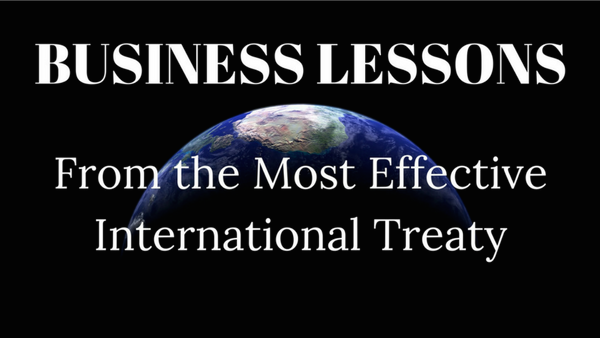What’s clear and protective, but with holes all over? You guessed it… the ozone layer. International Day for the Preservation of the Ozone Layer is fast approaching, and here’s why it matters for business.
September 16 marks the 30th Anniversary of the Montreal Protocol, a 1987 United Nations treaty developed to protect the ozone layer after scientists discovered an 8 million square mile hole in its shield. The Montreal Protocol is an exceptional example of a cohesive global effort. It’s the first-ever treaty to be unanimously approved, earning the signature of every UN member. The protocol successfully banned ozone-damaging chemicals called chlorofluorocarbons (CFCs), which were used primarily in cooling systems and aerosols. Cyndi Lauper fans didn’t need to worry, though–with the rapid phase-out of CFCs, alternative technologies allowed the hairspray industry to continue to boom.
The Montreal Protocol’s work isn’t over yet, however. Just before the turn of the century, hydrofluorocarbons (HFCs), replaced the majority CFCs. As it turns out, HFCs were only slightly less damaging to the ozone layer than CFCs, leading the 197 signatory countries of the Montreal Protocol to further amend the treaty. In October of 2016, the Kigali Amendment to the Montreal Protocol enacted the phasing-out of HFCs beginning in 2019.
The Montreal Protocol is often described as the most successful international environmental agreement for these top 3 reasons and its success factors can be applied to your business. Here’s what the Montreal Protocol teaches us:
- Make your problem clear and the solution clearer At the 1987 United Nations meeting in Montreal, the facts were laid out: CFCs are harming the ozone layer, and a global movement is required to counteract the damage. The dilemma was clear, and the solution (phasing out CFCs) seemed feasible. If you notice a problem, avoid complaining or presenting your team solely with the issue. Instead, do your best to consider and offer realistic solutions. Use facts and data to convey the relevance of the challenge and the necessity for action.
- Money matters A large part of the success of the Montreal Protocol relates to the Multilateral Fund. When presented with a hurdle, a successful leader or organization’s first thought is how much of a budget will be needed to address the challenge? The Montreal Protocol avoided the possibility of discouraging emerging market countries and economies by raising funds to bolster the implementation of new technologies.
- Be open to change and constant reevaluation The flexibility of the Montreal Protocol led to a maximization of support and efficiency. Initially, developing countries were given a longer grace period for when they had to comply with the new regulations, making signing the treaty less daunting for less wealthy nations. Additionally, the signatories of the Montreal Protocol meet every year to reevaluate the progress that has been made, and if any changes to the protocol should be put into effect. These meetings keep the Montreal Protocol relevant and efficient.
Rather than being resistant to change, the United Nations Environment Programme encourages it. Businesses are often held back by their resistance to change. It’s important to seek different perspectives and discuss revolutionary ideas. The change enacted by the Montreal Protocol resulted in unexpected innovation and efficiency spikes. Some cooling appliances sold after the original implementation of the Montreal Protocol were 60% more energy-efficient than their predecessors, and the switch to CFC-free air conditioning units in the United States saved enough electricity to power 620,000 homes.
Sharon Schweitzer and Emilie Lostracco co-wrote this post. Sharon Schweitzer, J.D., is a cross-cultural trainer, modern manners expert, and the founder of Access to Culture (formerly Protocol & Etiquette Worldwide). In addition to her accreditation in intercultural management from the HOFSTEDE centre, she serves as a Chinese Ceremonial Dining Etiquette Specialist in the documentary series Confucius was a Foodie, on Nat Geo People. She is the resident etiquette expert on two popular lifestyle shows: ABC Tampa Bay’s Morning Blend and CBS Austin’s We Are Austin. She is regularly quoted by BBC Capital, Investor’s Business Daily, Fortune, and the National Business Journals. Her Amazon #1 Best Selling book in International Business, Access to Asia: Your Multicultural Business Guide, now in its third printing, was named to Kirkus Reviews’ Best Books of 2015. She’s a winner of the British Airways International Trade Award at the 2016 Greater Austin Business Awards.
Emilie Lostracco is a Fall 2017 Cross-Cultural Communication Intern with Access to Culture. The Montreal native is currently a senior at the University of Texas at Austin, studying International Relations and Global Studies. Emilie specializes in international environmental efforts, European studies, and French. She plans on graduating with honors in December. Connect with her via Linkedin.
Photo Credit: Kevin Gill | Flickr


This title says it all – the EPA notes the Montreal Protocol is “considered by many the most successful environmental global action.” https://www.epa.gov/ozone-layer-protection/international-actions-montreal-protocol-substances-deplete-ozone-layer